Japan's Official Development Assistance White Paper 2007
Feature — Towards a Vibrant Africa —
Africa, the continent blessed with beautiful nature, energy-filled people, and abundant resources has a history of prosperity and great potential for the future. Though facing various difficulties at present, Africa will become a moving force in the development of human society in the 21st century if it can overcome its challenges, and open the way to a brighter future. Japan and the rest of international community put emphasis on African development. This is because resolving the issues that African people face and achieving peace and stability in this continent is the key to stability and prosperity of the international community in the 21st century.
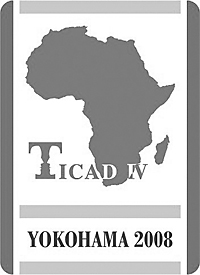
1. The Adversities and Hopes of Africa
Many of the issues that confront the international community are concentrated within Africa, including poverty, infectious diseases, conflict, and refugees. Despite the fact that approximately 14% of the world's population, or 900 million people, live in Africa, the total GDP of Africa amounts to only US$1,696 billion, a mere 2.2% of the world total. There are 50 countries classified as LDC within the world, out of which 34 are in Sub-Saharan Africa. The proportion of people whose income is less than US$1 a day in Sub-Saharan Africa is on the decline; however, the figure still exceeds 40%.1 Furthermore, many armed conflicts broke out in Africa, involving complex economic, ethnic and religious factors. The conflicts have increased the number of refugees and internally displaced persons, the rate of environmental destruction and the prospects of economic stagnation. The population of concern to the UN Refugee Agency (UNHCR) surpasses 9.5 million overall in Africa, accounting for approximately 30% of the world's refugees.2 Peace is the fundamental requirement for development. The resolution of conflicts and consolidation of peace3 are vital for African development.
On the other hand, promising signs have been observed within Africa in recent years. Civil war and regional conflict have ended in many parts of Africa, and advancements towards democratic political systems are occurring in many countries.4 On the economic front, Africa has maintained an average yearly economic growth of 5% since 2004, while some countries are reaching rates that exceed 10%. It is believed that this growth is achieved through the improvement of policy by African countries, in addition to external factors such as price increases in primary commodities. It is necessary for the international community to continue support in order to build on these positive developments in Africa, by fostering sustainable growth, and enabling African countries to address the various challenges they face.
2. Africa - Far Away Yet Close to Home
While it is the responsibility of Japan as a developed country to proactively provide cooperation to Africa, a continent that has numerous developmental challenges, it is also meaningful from the perspective of utilizing Japan's experience with development aid, which Japan has built up for over 50 years, to stimulate growth in Africa. Resolving issues in Africa also links directly to the national interests of Japan. For instance, the threat of infectious diseases is one that impacts the entire world, including Japan. The African continent produces over 10% of the world's oil, and has abundant mineral resources, including diamonds, and rare metals such as platinum and cobalt. The proper management and development of these natural resources will bring economic growth to Africa, which then will contribute to the stability of the international community.
3. The Concept of Japan's Assistance for Africa - TICAD's Role Thus Far -
The international community is working cooperatively to assist Africa. Japan announced at the 2005 Asian-African Summit that ODA to Africa would be doubled over the ensuing three years. Japan created the Tokyo International Conference on African Development (TICAD), a forum for holding comprehensive discussions about development in Africa, and currently focuses on assistance to Africa through TICAD. TICAD is a forum that is open to other interested countries and international organizations in addition to Japan and African countries. Japan emphasizes the use of TICAD to present possible efforts for development by Africa and cooperation from the international community over five- and 10-year time frames.
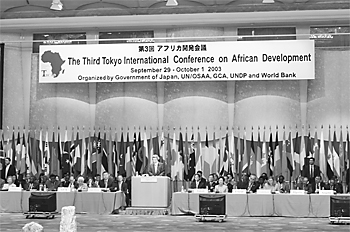
TICAD III (2003)
Chart I-17. TICAD Coorganizers
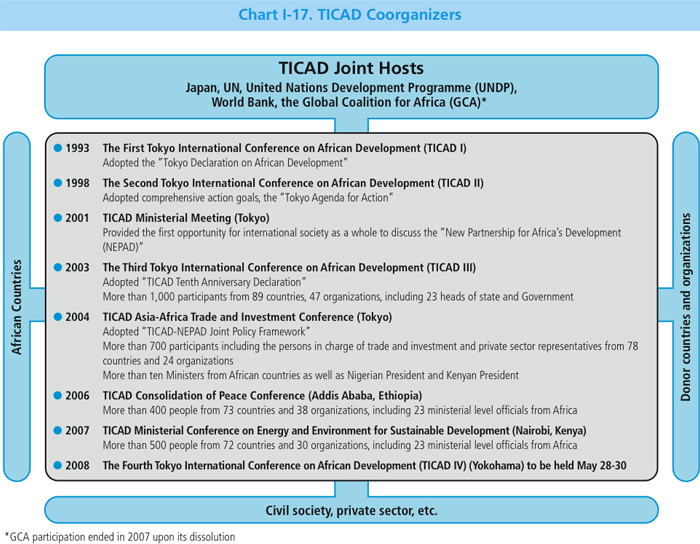
(1) Directing the World's Attention to Africa
At the beginning of the 1990s, the international community's interest in Africa had somewhat decreased due to aid fatigue and the ongoing civil wars and regional conflicts in many non-African areas that were sparked by the end of the Cold War. Japan thereupon worked together with the UN and called on the wide participation of the international community to hold TICAD I in 1993. At TICAD I, a total of 79 countries including 48 African countries, the EC, and 26 international organizations participated to create an impetus for once again focusing the interest of the international community on Africa. TICAD later held its second (1998) and third (2003) conferences, in addition to the sector-based ministerial meetings, including for trade, investment, the environment, and energy. The heightening of interest in African development in recent years can be seen in the documents produced on discussions about African development at the G8 Summit every year. After progressing through numerous processes, TICAD will mark its 15th year at the fourth conference (TICAD IV) to be held in Yokohama in 2008.
(2) Ownership and Partnership
Through TICAD, Japan has asserted the importance both of ownership (self-help) by African countries and partnerships (cooperation) with the international community. In order for African countries to develop, they must not put too much reliance on aid from developed countries, but rather build the capacity to resolve issues by themselves. It is also important that the international community cooperates in supporting these undertakings by African countries. The concept of "ownership and partnership," which is currently widely used in African development, has gradually spread through the international community, including Africa, through TICAD. The concept also greatly impacted the establishment of the New Partnership for Africa's Development (NEPAD)5, a comprehensive development strategy drafted by African countries.
4. Towards TICAD IV - Towards a Vibrant Africa -
In order to support the emerging trend of political and economic development in Africa, the basic concept of TICAD IV, to be held in May 2008, will be "Towards a Vibrant Africa." Under this banner, there are three core areas: 1) boosting economic growth; 2) ensuring human security (including the achievement of the MDGs and consolidation of peace); and 3) addressing environmental/climate change issues. The conference will provide a forum for the international community as a whole to support African development, and Japan is now studying ways in which it can contribute.
(1) Boosting Economic Growth
Support for "boosting growth" will be strengthened at TICAD IV in order to maintain the current steady economic growth of Africa as a whole - an annual average of 5% or higher - and ensure that it is sustainable. This means that efforts for "poverty reduction through economic development," which was one pillar of previous TICAD conferences, will be intensified ever more. To this end, Japan is considering a plan for advancing infrastructure development covering a wide area such as a roadway network. Japan plans to focus on cooperation with international organizations and developed nations. One way is to utilize Enhanced Private Sector Assistance (EPSA) for Africa, which was announced in concord with the African Development Bank (AfDB). Another is to host the 4th Annual Meeting of the Infrastructure Consortium for Africa6 in March 2008, which will bring together organizations related to Africa, aid donor countries, and international organizations. Japan will promote trade in Africa by steadily implementing the Development Initiative for Trade announced in 2005. Japan is also considering strengthening support for the areas of agriculture and resource development, both of which contribute to growth in Africa.
Additionally, Japan held the Fourth Africa-Asia Business Forum in Tanzania in February 2007 with the cooperation of the UNDP and United Nations Industrial Development Organization (UNIDO) in order to fortify the trade and investment relationship between Asia and Africa. Over 150 companies from Asia and Africa (including enterprises from Japan) participated in the forum. As a result of the active business discussion at the forum, a memorandum was signed to surpass the disbursement amounts of the past three forums.
Assistance to Facilitate Customs Procedures
The issue of undeveloped infrastructure in Africa, which is a great constraint on distribution, extends from roads to procedures for passing customs. Specifically, undeveloped infrastructure include the issues of: 1) lack of infrastructure for regional agreements and their operations; 2) troublesome procedures that differ from country to country; 3) delays in computerizing documents; 4) the inadequate level of professionalism displayed by customs authorities; and 5) the underdeveloped border facilities. In order to resolve these issues, Japan is currently providing support for the implementation of a One Stop Border Post (OSBP) that will allow people to complete customs procedures in one stop, by having countries that border each other jointly conduct customs, quarantine, and immigration procedures. In 2007, it was decided to implement training through Japanese grant aid for border personnel between Zambia and Zimbabwe, in order to establish a one stop border post on the Chirundu Bridge, which was completed in 2002. Furthermore, Kenya, Tanzania, and Uganda set up a customs union in 2005, and transportation needs are anticipated to grow in the region. In 2007, in relation to this union, Japan decided to provide a yen loan for improving the international trunk road that connects Kenya's Athi River and Arusha, a city in Tanzania. Japan is providing supports for constructing a one stop border post in the city of Namanga. Japan additionally plans to provide technical cooperation to improve the performance of customs personnel in accordance with the installation of another OSBP for the three countries, including Kenya.
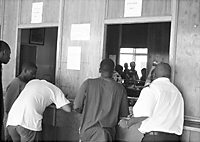
Immigration control at the current facility in Zimbabwe (Photo: JICA)
The issue of undeveloped infrastructure in Africa, which is a great constraint on distribution, extends from roads to procedures for passing customs. Specifically, undeveloped infrastructure include the issues of: 1) lack of infrastructure for regional agreements and their operations; 2) troublesome procedures that differ from country to country; 3) delays in computerizing documents; 4) the inadequate level of professionalism displayed by customs authorities; and 5) the underdeveloped border facilities. In order to resolve these issues, Japan is currently providing support for the implementation of a One Stop Border Post (OSBP) that will allow people to complete customs procedures in one stop, by having countries that border each other jointly conduct customs, quarantine, and immigration procedures. In 2007, it was decided to implement training through Japanese grant aid for border personnel between Zambia and Zimbabwe, in order to establish a one stop border post on the Chirundu Bridge, which was completed in 2002. Furthermore, Kenya, Tanzania, and Uganda set up a customs union in 2005, and transportation needs are anticipated to grow in the region. In 2007, in relation to this union, Japan decided to provide a yen loan for improving the international trunk road that connects Kenya's Athi River and Arusha, a city in Tanzania. Japan is providing supports for constructing a one stop border post in the city of Namanga. Japan additionally plans to provide technical cooperation to improve the performance of customs personnel in accordance with the installation of another OSBP for the three countries, including Kenya.

Immigration control at the current facility in Zimbabwe (Photo: JICA)
(2) Ensuring Human Security
Japan has provided various assistance in response to the needs of communities based on the notion of human security. For instance, the African Village Initiative was announced in order to strengthen the capacity within African agricultural communities. In accordance with this initiative, construction of schools, digging of wells, school lunches and health services for all of the regional community are being carried out at the same time. Furthermore, Japan supports the African Millennium Village, which is implemented by the UNDP through the Trust Fund for Human Security. With TICAD IV in sight, Japan will implement assistance more effectively through coordinating these two community development projects, while also utilizing the new grant aid introduced in 2006 - the grant aid for community empowerment - to push forward community development. Japan will also promote assistance in the area of health and education that have direct bearing on achieving the MDGs as well as linkages to human security.
In order to ensure human security, it is necessary to make preventative efforts against conflict, keep post-conflict turmoil to a minimum, and support the consolidation of peace. Until now, Japan has provided aid for the consolidation of peace through ODA, for areas including the Demobilization, Disarmament and Reintegration program (DDR), the collection of small arms, and landmine countermeasures, in addition to providing humanitarian aid and assistance for refugees. Japan will continue to provide aid within these sectors in the future in order to support the consolidation of peace in Africa.
In recent years, Africa has undertaken comprehensive efforts for its own peace and security including development of the African Standby Force (ASF) for peacekeeping duties throughout the continent and training of African staff engaged in peace support operations at various peacekeeping centers throughout Africa. In supporting Africa, Japan faces the issue of how to address requests for peacekeeping and peace consolidation capacity building by African countries.
(3) Addressing Environment/Climate Change Issues
In March 2007, in Kenya, Japan held the TICAD Ministerial Conference on Energy and Environment for Sustainable Development. The African continent is one of the regions most vulnerable to the impact of global climate change, and during the meeting it was indicated that African countries have a strong sense of this danger. Adaptation measures for climate change are becoming more and more important for advancing African development as they will lead to eliminating obstacles that interfere with growth in Africa. Japan is pushing the mainstreaming of adaptation measures in African countries while at the same time considering strengthening assistance in this sector. Based on Cool Earth 50,7 a proposal concerning climate change announced in May 2007 by then Prime Minister Shinzo Abe and having TICAD IV in mind, Japan plans to continue aid for countermeasures against climate change in Africa. These measures may include: extending aid for building capacity to adapt to flooding and drought; strengthening monitoring systems for weather observation; assisting in the improvement of energy efficiency and conservation utilizing Japan's technologies on energy conservation and advanced energy; and preserving carbon sink forests.
(4) Applying Asia's Experience in Africa
The effectiveness of sharing lessons based on knowledge and experience that enabled economic growth in Asia is currently being recognized in Asia-Africa cooperation - an important contribution in the TICAD process - and it is anticipated that this method of sharing will be utilized into the future. Japan has promoted Asia-Africa cooperation through means such as dispatching human resources from Asia to Africa to assist its development. In 2006, Japan established the Asia Youth Volunteers Programme dispatching youth from Asia to Africa for a one-year period to work for African development. It is actually difficult to apply Asia's experience within Africa without modification, as the historical background and financial and social situations, differ between the two regions. On the other hand, the wish to learn from Asia's experience is being voiced among various African countries. It is necessary for Japan to analyze the experience accumulated by Japan in Asia and Africa and the realities of the African continent, and to leverage its knowledge and unique experience to make constructive, long-term contributions to African development.
Promoting South-South Cooperation between Asia and Africa
1) Madagascar-Indonesia Cooperation
Madagascar faces a challenge of improving productivity of the cultivation of rice, the country's staple food. Since 2000, Japan has dispatched Indonesian experts to Madagascar to work on appropriate agricultural machinery development and expanding rice cultivation. This led to positive results as experts transferred various technology, including creating prototypes of agricultural machinery, such as for hand threshing and winnowers, calculating desirable seed amounts for improving rice cultivation productivity, and also expanding the use of compost. This cooperation was highly valued at the project site. In 2006, additional experts on improving soil and raising livestock were dispatched.
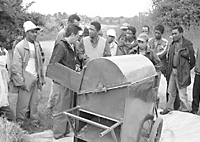
Indonesian experts teaching in Madagascar (Photo: JICA)
2) Zambia-Malaysia Cooperation
In response to fortuitous international price increase in copper in recent years, Zambia is currently achieving growth that surpasses the African average. But Zambia faces the challenge of diversifying its industries, so as not to depend solely on copper, in order to sustain stable growth. Japan is assisting the development of an investment environment in Zambia through efforts such as dispatching the former Deputy Director General of the Malaysian Industrial Development Authority as an advisor to Zambia.
1) Madagascar-Indonesia Cooperation
Madagascar faces a challenge of improving productivity of the cultivation of rice, the country's staple food. Since 2000, Japan has dispatched Indonesian experts to Madagascar to work on appropriate agricultural machinery development and expanding rice cultivation. This led to positive results as experts transferred various technology, including creating prototypes of agricultural machinery, such as for hand threshing and winnowers, calculating desirable seed amounts for improving rice cultivation productivity, and also expanding the use of compost. This cooperation was highly valued at the project site. In 2006, additional experts on improving soil and raising livestock were dispatched.

Indonesian experts teaching in Madagascar (Photo: JICA)
2) Zambia-Malaysia Cooperation
In response to fortuitous international price increase in copper in recent years, Zambia is currently achieving growth that surpasses the African average. But Zambia faces the challenge of diversifying its industries, so as not to depend solely on copper, in order to sustain stable growth. Japan is assisting the development of an investment environment in Zambia through efforts such as dispatching the former Deputy Director General of the Malaysian Industrial Development Authority as an advisor to Zambia.
Medical Cooperation in Africa and Establishment of the Hideyo Noguchi Africa Prize
The spread of infectious diseases is a common threat to humanity. Especially in Africa, calls for resolving this issue are strong. Hideyo Noguchi visited Accra in the British Gold Coast (currently Ghana) for research on yellow fever in 1927. Approximately 50 years later (1979), Japan assisted in the creation of the Noguchi Memorial Institute for Medical Research8 in Ghana, and provides ongoing medical cooperation in Africa. Recently, Japan announced the Health and Development Initiative, mainly for Africa, at the G8 Gleneagles Summit in 2005. Furthermore, Japan also announced that US$5 billion of comprehensive cooperation would be provided over five years for enriching pediatric care and for countermeasures against infectious diseases. On a visit to Ghana in 2006, then Prime Minister Junichiro Koizumi proposed the creation of the Hideyo Noguchi Africa Prize at a press conference after a meeting with President John Agyekum Kufuor. The prize is awarded to individuals that have made distinguished achievements in the field of medical research or medical activities for controlling infectious diseases in Africa, and the prize aims to ameliorate the health and welfare of people living in Africa, and consequently all humanity. Japan will bestow ¥100 million to each of the award winner from medical research and medical activities at the first award ceremony scheduled to be held at TICAD IV in 2008.

(Photo: Hideyo Noguchi Memorial Association)
The spread of infectious diseases is a common threat to humanity. Especially in Africa, calls for resolving this issue are strong. Hideyo Noguchi visited Accra in the British Gold Coast (currently Ghana) for research on yellow fever in 1927. Approximately 50 years later (1979), Japan assisted in the creation of the Noguchi Memorial Institute for Medical Research8 in Ghana, and provides ongoing medical cooperation in Africa. Recently, Japan announced the Health and Development Initiative, mainly for Africa, at the G8 Gleneagles Summit in 2005. Furthermore, Japan also announced that US$5 billion of comprehensive cooperation would be provided over five years for enriching pediatric care and for countermeasures against infectious diseases. On a visit to Ghana in 2006, then Prime Minister Junichiro Koizumi proposed the creation of the Hideyo Noguchi Africa Prize at a press conference after a meeting with President John Agyekum Kufuor. The prize is awarded to individuals that have made distinguished achievements in the field of medical research or medical activities for controlling infectious diseases in Africa, and the prize aims to ameliorate the health and welfare of people living in Africa, and consequently all humanity. Japan will bestow ¥100 million to each of the award winner from medical research and medical activities at the first award ceremony scheduled to be held at TICAD IV in 2008.

(Photo: Hideyo Noguchi Memorial Association)
*As seen below, this White Paper covers a wide range of undertakings within Africa. Please refer to these as well.



 Next Page
Next Page